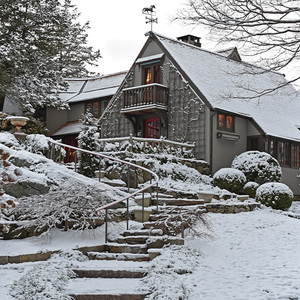*
I need some advice on the topic of French Drains. I have water seepage on one wall in the basement from ground water. I have heard many pros and cons of installing an interior french drain. Of course, the best solution is to install an exterior drain, but the cost would be tremendous given the patios, landscaping and other obstacles around my house. I do not even have a sump pump in my basement. Do these interior french drains work? Is it worth my time of installing one and finding out later that it does not work? I appreciate your response.
Discussion Forum
Discussion Forum
Up Next
Video Shorts
Featured Story

There's a constant source of clean water for you to use, and all you have to do is collect it.
Featured Video
Builder’s Advocate: An Interview With ViewrailHighlights
"I have learned so much thanks to the searchable articles on the FHB website. I can confidently say that I expect to be a life-long subscriber." - M.K.














Replies
*
Pammy,
Yes, the interior drains do work and come in many different
flavors. However, be very careful when choosing the contractor. Any type of specialty construction like this breeds many "snake oil salesmen". Also, don't be penny wise and dollar foolish.
Even without knowing anything about your house and surrounding landscape, I would say that chances are, adding an exterior drain will be prohibitively expensive. In addition, if not performed properly, the process could actually make your situation worse. First, excavating and backfilling the soil adjacent to an existing wall that is restrined from movement(all of your walls) will significantly affect the lateral earth pressures experienced by the wall. Second, if the drain is not carefully constructed and does not actually drain water away from the walls(you'd be surprised!!!), but allows it to build up behind the wall, you will have a wet basement and/or damaged walls. I have actually seen an entire foundation wall pushed into the basement after an inexperienced contractor attempted to "waterproof" the wall. The hydrostatic pressure from subsequent rain built up behind the wall and pushed in right down.
I would recommend contacting several different, reputable contractors. If you are planning on finishing your basement, the different methods and configurations of the interior drains will have different spatial effects upon your future construction. Good luck.
*
Pammy - First (this really should come first) - Since you report only one wall / area involved, look at conditions above and at grade at that point outside. Extend leader discharge at least 4 feet away from wall - better yet tie in underground and carry away to daylight drain discharge. Are gutters overflowing at this location? Fix that and leaders first. Does grade slope away? Are your patios and landscaping contributing to the problem by pitching toward the house? If your gutters overflow into a lanscaped area with, say railroad ties and raised beds this will greatly aggravate the problem.
You will hear more on this from others - fix the outside problems first if you can before dealing with things on the inside.
Jeff C. (Arch't)
*
I need some advice on the topic of French Drains. I have water seepage on one wall in the basement from ground water. I have heard many pros and cons of installing an interior french drain. Of course, the best solution is to install an exterior drain, but the cost would be tremendous given the patios, landscaping and other obstacles around my house. I do not even have a sump pump in my basement. Do these interior french drains work? Is it worth my time of installing one and finding out later that it does not work? I appreciate your response.